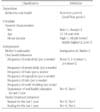Abstract
Objectives
This research was conducted to identify the effects of a mother's nationality on adolescent oral health using data from the Korea Youth Risk Behavior Web-based Survey (2016).
Methods
This research matched adolescent health behavior online survey results using propensity score matching and identified the influence of a mother's nationality on her adolescent child's oral health. A total of 715 adolescents whose mothers' nationalities were identified as not Korean were selected as research participants, and 715 adolescents were selected from 62,349 individuals whose mothers' nationalities were identified as Korean as a comparison group to undergo propensity score matching.
Results
Having a non-Korean mother showed no influence on adolescents' subjective oral health. Socioeconomic characteristics, oral health behaviors, and experience visiting dental clinics were identified as affecting oral health.
Conclusions
The relationship between the characteristics of a multi-cultural family and oral health shown in this research suggests that health and welfare services essential to protect the rights to health must be maintained. Moreover, the results suggest that health services that focus on socioeconomically disadvantaged multi-cultural families must be seriously considered.
Figures and Tables
References
1. Kim H, Yeo J, Jung J, Baek S. Health status of marriage immigrant women and children from multcutural families and health policy recommedation. Seoul: Korea Institute for Helath and Social Affairs;2012. p. 46–58.
2. Seol DH, Kim YT, Kim HM, Yoon HS, Lee HK, Im KT, et al. Foreign wives' life in Korea: focusing on the policy of welfare and health. Gwacheon: Ministry of Health and Welfare;2005. p. 19–45.
3. Lee S. Migration and health: a theoretical perspective. Goyangsi: IOM Migration Research & Training Centre;2011. p. 2–15.
4. World Heatlh Organization. Health of migrants: the way forward: report of a global consultation. Madrid: World Health Organization;2010. p. 27–71.
5. Kim H. Health problems and policy issue of multicultural families. Health Welf Issue Focus. 2013; 185:1–8.
6. Lempert S, Froberg K, Christensen L, Kristensen P, Heitmann B. Association between body mass index and caries among children and adolescents. Community Dent Oral Epidemiol. 2014; 42:53–60.

7. Shonkoff JP. Building a new biodevelopmental framework to guide the future of early childhood policy. Child Dev. 2010; 81:357–367.

8. Nicolau B, Netuveli G, Kim JWM, Sheiham A, Marcenes W. A life-course approach to assess psychosocial factors and periodontal disease. J Clin Periodontol. 2007; 34:844–850.

9. Loucks EB, Sullivan LM, Hayes LJ, D'Agostino RB, Larson MG, Vasan RS, et al. Association of educational level with inflammatory markers in the Framingham Offspring Study. Am J Epidemiol. 2006; 163:622–628.

10. Ma J, Cho M. Effect of health behaviors on oral health in Korean adolescents. J Korean Acad Dent Hyg. 2016; 40:100–104.

11. Lim CY, Oh H. The relationship between oral health behaviors and periodontal health status of Korean adolescents. J Korean Acad Oral Health. 2013; 37:65–72.

12. Lee TH, Choi S, Lee J, Park B, Paik H, Jin B. Oral health beliefs and cultural specificity in multicultural families. J Korean Acad Oral Health. 2015; 39:220–225.

13. Bae J. Comparison study on the oral health behaviors of multicultural family adolescents and native family adolescents in Korea. Korean J Health Educ Promot. 2014; 31:71–79.

14. Lee TH, Choi S, Lee J, Park B, Paik H, Jin B. Oral health beliefs and cultural specificity in multicultural families. J Korean Acad Oral Health. 2015; 39:220–221.

15. Jeon E, Jin H, Choi S, et al. Oral health status in women of Korean multicultural families. J Korean Acad Dent Health. 2009; 33:499–509.
16. Seo Y, Lee G, La J, An S, Kim Y. A survey on dental health of children of multicultural families in Chonbuk province. J Korean Acad Pediatr Dent. 2011; 38:137–145.

17. The Twelfth Korea Youth Risk Behavior Web-Based Survey. Osong: Ministry of Health and Welfare;2016. p. 1–163.
18. Do KY. Impact of health risk factors on the oral health of Korean adolescents: Korea Youth Risk Behavior Web-based Survey, 2013. J Dent Hyg Sci. 2016; 16:193–199.

19. Seo Y, Lee G, La J, An S, Kim Y. A survey on dental health of children of multicultural families in Chonbuk province. J Korean Acad Pediatr Dent. 2012; 39:111–119.

20. Jang MH, Park CG. [Risk factors influencing probability and severity of elder abuse in community-dwelling older adults: applying zero-inflated negative binomial modeling of abuse count data]. J Korean Acad Nurs. 2012; 42:819–832.

21. Caliendo M, Kopeinig S. Some practical guidance for the implementation of propensity score matching. Discuss Pap Ser. 2005; 22:31–72.

22. Rosenbaum PR, Rubin DB. The central role of the propensity score in observational studies for causal effects. Biometrika. 1983; 70:41–55.

23. Lee M, Choi E, Chung W, Son J, Chang S. The Effects of Perceived Stress on Dietary Habits and Oral Health Behaviors in Korean Adolescents. J Dent Hyg Sci. 2013; 13:440–448.
24. Ka K, Moon S, Ku I. The relationship between of marriage migrant women's oral health belief and self-efficacy on oral health awareness. J Korea Acad Ind Coop Soc. 2015; 16:8487–8497.

25. Lee Y. A survey on oral health of children and adolescents from multicultural families in Gwangju city [master's thesis]. Gwangju: Chonnam National University;2015. [Korean].
26. Abdelmawla AH, Langley RW, Szabadi E, Bradshaw CM. Comparison of the effects of venlafaxine, desipramine, and paroxetine on noradrenaline- and methoxamine-evoked constriction of the dorsal hand vein. Br J Clin Pharmacol. 1999; 48:345–354.





 PDF
PDF ePub
ePub Citation
Citation Print
Print






 XML Download
XML Download